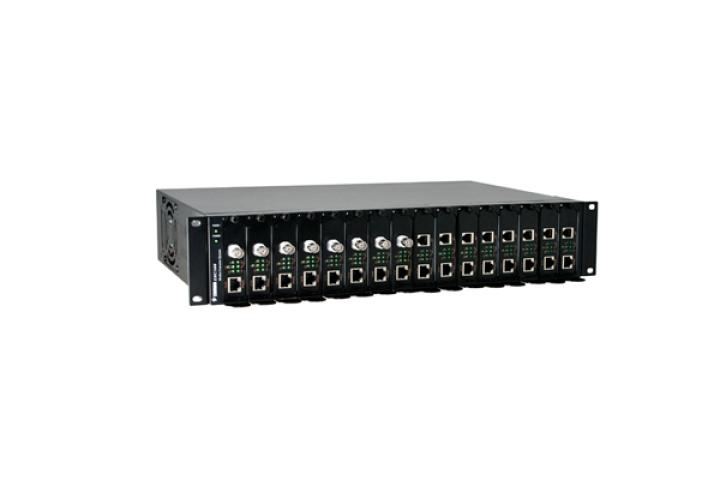Why Use an Industrial Media Converter ?
EtherWAN's media converters are required to pass real-time data transfer test under -40°C to 85°C for 72 hours. More default reliability tests include vibration, drop, electrostatic discharge immunity, electrical fast transient and burst immunity, surge immunity, EMI radiation and conduction are all done in EtherWAN labs.
Hardened PoE 10/100/1000BASE-T to 100/1000BASE Dual Rate Media Converter
The EL2242 provides media conversion between 10/100/1000BASE-T(X) and 100/1000 BASE SFP fiber. Through DIP switch selection, Link-Fault-Pass-Through (LFPT) function can be enabled or disabled. EL2242 supports IEEE 802.3at PoE/PSE standard and can transmit power and data over one STP cable. The EL2242's hardened design features high shock and vibration, electrical noise immunity and a wide operating temperature range from -40 to 75°C. EL2242 is the ideal media converter for harsh environments.

10/100BASE-TX to 100BASE-FX Media Converter
The EL100 Series provide media conversion between 10/100BASE-T(X) and 100BASE-FX Fiber. Easy plug-andplay design facilitates network infrastructure construction. Through DIP switch selection, Link-Fault-Pass-Through (LFPT) function can be active or disabled. User can choose between store-and-forward mode and converter mode through DIP switch selection. The EL100 series is designed for SC or ST fiber connection applications. The commercial grade media converter supports EtherWAN EMC1600 chassis system for easy group installation.

4/12/16-Bay Media Converter Chassis
The EMC400 Series, 4-slot Din-Rail mount chassis brings Flexibility, Reliability and Redundancy to mission critical network infrastructures. Its flexible design allows for a variety of EtherWAN Media Converters and Ethernet Extenders to be combined into one chassis giving users a solution that fits the needs of each individual network installation. Designed with dual power inputs, the EMC400 Series allows for two separate power sources to increase reliability and dependability eliminating the single point of failure of a single power source.

Frequently asked questions on Media Converters
What is a media converter used for?
Media converters serve as a bridge between fiber optic and copper media (cables and ports). Options include single mode, multi-mode, and WDM (Wavelength-division multiplexing) fiber optic and 10/100/1000 Mbps copper media, allowing for stable and high-speed connection of geographically distant LANs. Because fiber media is best for long-distance transmission, media converters often come into use when connecting remote locations.
Watch Videos: Why take the risk? Insure with EtherWAN's high reliability media converters
What is an industrial media converter?
Industrial media converters are tougher and have better long-term reliability than commercial media converters. They can operate in more extreme temperature ranges and in harsher conditions. But their function is essentially the same – connecting copper cables to fiber and vice-versa.
* See this article : Why Use an Industrial Media Converter ?
How does a fiber media converter work?
Fiber media converters connect fiber cables and media to copper ones. They “convert” received data into the form needed to send I to the next media type. This allows for the extension of networks over great distances, and also for the integration of older copper-based systems and devices with newer ones.
Can a media converter convert fiber to Ethernet?
Yes. Fiber to Ethernet media converters transform incoming signals from fiber connections to UTP / RJ-45 supported signal types. Conversion options include single multimode fiber, as well as dual and single fiber.
What is PoE media converter?
A PoE media converter delivers power through the copper cabling as well as the converted fiber signal. PoE Media Converters can support the IEEE 802.3at standard and can transmit up to 15 watts over one RJ45 / STP cable.
More products you might be interested in

EL8100 Series

EL2242

EL900 Series

EL1141 Series

EL1142 Series







